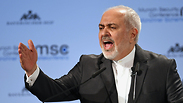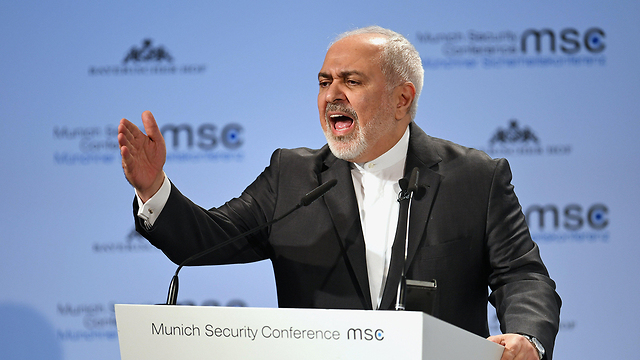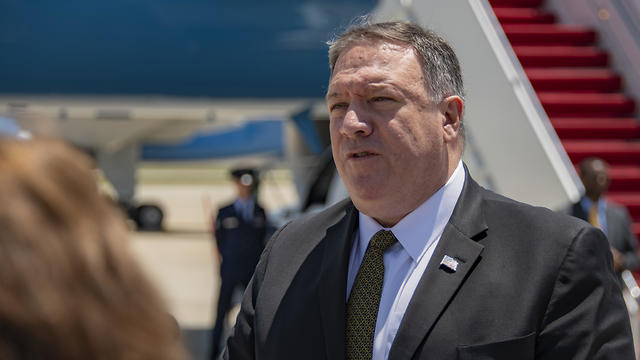
Iranian Foreign Minister Zarif
Photo: Reuters

Iranian foreign minister: 'Military strike against Iran would result in 'all-out war''
Iranian Foreign Minister Zarif 'Iran won't blink in defending itself; Iranian oil minister blames U.S. for using oil as weapon against the Islamic Republic and claims economic conditions worse than in Iran-Iraq war
Any U.S. or Saudi military strike against Iran would bring "all-out war", Tehran said on Thursday, keeping up a drumbeat of warnings to its adversaries after they accused the Islamic Republic of a strike on Saudi oil facilities.
"I am making a very serious statement that we don't want war; we don't want to engage in a military confrontation ... But we won't blink to defend our territory," Iranian Foreign Minister Mohammed Javad Zarif told CNN in an interview.
Asked what the consequence of an American or a Saudi military strike on Iran would be, Zarif said "an all-out war".
The United States has been discussing with Saudi Arabia and other Gulf allies possible responses to an attack on Saudi oil facilities on Saturday which they blame on Iran, and which U.S. Secretary of State Mike Pompeo described as an act of war on the kingdom.
Zarif had earlier warned on Twitter that what he described as the B team - including Prime Minister Benjamin Netanyahu and Saudi Crown Prince Mohammed Bin Salman - was deceiving U.S. President Donald Trump into a war against Iran.
The attack was claimed by Yemen's Iran-aligned Houthi group.
Foreign Ministry spokesman Abbas Mousavi said that Washington and Riyadh had accused Iran "because they don't believe the oppressed Yemeni nation has reached such a capability," the state news agency IRNA reported.
Meanwhile, the semi-official news agency ISNA quoted Rear Admiral Habibollah Sayyari as saying Iran's adversaries would regret any aggression against it.
MANY OPTIONS SHORT OF WAR
Trump struck a cautious note on Wednesday. He said there were many options short of war with Iran, which denies involvement in the Sept. 14 strikes that initially halved Saudi oil output. He ordered more sanctions on Tehran.
Zarif also said in a tweet on Thursday that Pompeo was trying to delay issuing visas for the Iranian delegation to the upcoming United Nations General Assembly.
Trump said he is not looking to meet Iranian President Hassan Rouhani during a U.N. event in New York this month.
Separately, Oil Minister Bijan Zanganeh accused the United States of using oil as a "weapon" and said economic conditions were harder under the current U.S. sanctions than during the 1980-88 Iran-Iraq.
"Now the situation has become more difficult economically than during the war," Zanganeh was quoted as saying by the Iranian oil ministry's SHANA news agency.
"At the time of the war, we would sell our oil and get our money and buy whatever we wanted, but now the conditions are very complicated," Zanganeh said, referring to banking sanctions which make it hard for Tehran to receive its oil income.
Referring to the effect of attacks on Saudi oil installations, Zanganeh said: "I don't think it's an important issue, and soon the balance will be restored in the market."
Oil prices, which soared after the attack, steadied after Riyadh vowed to restore full output by the end of September.

















